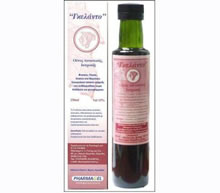
Λεξικό .. Acetylsalicylic acid (A.C.)
NSAIDs-including aspirin (ASA)-that inhibit cyclooxygenase (COX)-1 induce nonallergic hypersensitivity reactions consisting of attacks of rhinitis and asthma. Such reactions occur exclusively in a subset of asthmatic patients who also have underlying nasal polyps and chronic hyperplastic eosinophilic sinusitis. We now refer to their underlying inflammatory disease of the entire respiratory tract as aspirin-exacerbated respiratory disease [1].
A.C. is a symptom provoking factor in patients with vasomotor rhinitis. Patients with nasal polyps who have symptoms associated with acetylsalicylic acid should be advised to avoid not only this drug but also other cyclo-oxygenase inhibitors and in some cases, all dyes and preservatives in food. Acetylsalicylic
acid is a cyclo-oxygenase inhibitor of prostaglandin synthesis. It has been reported to be a vasoconstrictor, though the efficacy of this type of drug for the treatment of rhinitis requires further study [2]. (See also aspirin intolerance; NSAIDs).
1. Stevenson DD. Aspirin sensitivity and desensitization for asthma and sinusitis. Curr Allergy Asthma Rep. 2009 Mar;9(2):155-63.
2. NSAIDs Task Force Report: Asthma and the other allergic diseases. U.S. Department of Health, Education and Welfare. NIH Publication 1979;No. 79;387.
Γκέλης Ν.Δ. - Λεξικό Αλλεργίας - Εκδόσεις ΒΕΛΛΕΡOΦΟΝΤΗΣ - Κόρινθος 2013
Gelis Ν.D. - Dictionary of Allergies - VELLEROFONTIS Publications - Corinth 2013




